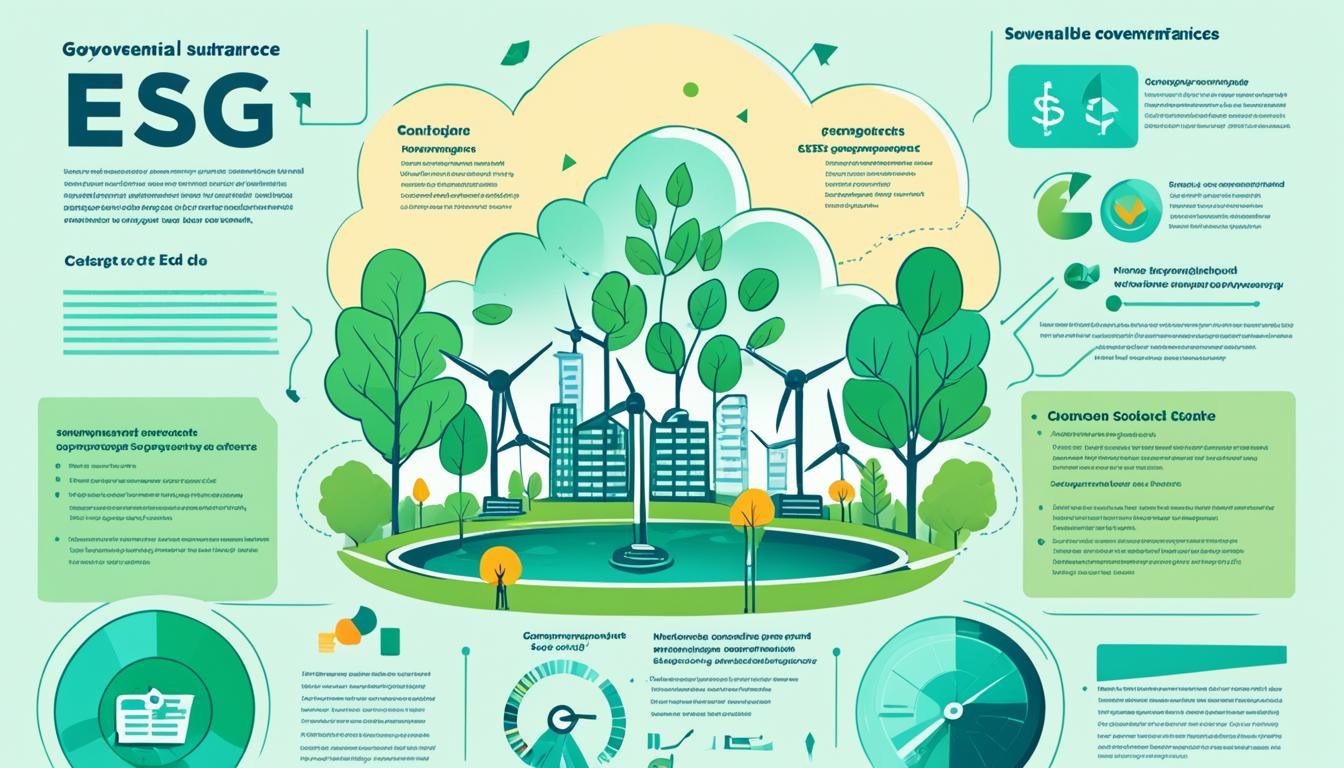Environmental, Social, and Governance (ESG) Reporting Software
Did you know that 78% of investors consider environmental, social, and governance (ESG) factors when making investment decisions? With the rising demand for sustainable practices, organizations are increasingly focusing on ESG reporting to demonstrate their commitment to responsible business operations. ESG reporting software offers a powerful solution for businesses to streamline their sustainability efforts and effectively manage their ESG data.
Investors, consumers, and regulators are placing a significant emphasis on ESG considerations, making ESG reporting an essential component of business decision-making. By leveraging ESG reporting software, organizations can track key sustainability metrics, measure their environmental and social impacts, and meet the demands of various stakeholders.
In this article, we will explore the features and benefits of ESG reporting software, its importance in compliance and risk management, and its role in enhancing stakeholder engagement. We will also discuss how to choose the right ESG reporting software provider and explore the future of this rapidly evolving technology.
Key Takeaways:
- ESG reporting software is crucial for organizations to demonstrate their commitment to sustainability and responsible business practices.
- Investors, consumers, and regulators increasingly consider ESG factors when making decisions, highlighting the importance of ESG reporting.
- ESG reporting software offers features such as automated data collection, customizable reporting, and environmental impact assessment.
- By adopting ESG reporting software, businesses can ensure compliance, manage risks, and enhance stakeholder engagement.
- Choosing the right ESG reporting software provider is essential for effectively managing ESG data and meeting reporting requirements.
The Importance of ESG Reporting in Business Decision-Making
ESG reporting has become a crucial factor in making informed business decisions. As companies strive to quantify and disclose their impact on the environment, social initiatives, and governance structures, ESG reporting provides a valuable framework for measuring and communicating these efforts. It is not only investors who are placing increasing importance on ESG considerations, but consumers and regulators as well.
By implementing ESG reporting software, businesses can improve their sustainability performance measurement, align with corporate responsibility goals, and meet the demands of various stakeholders. ESG reporting software allows organizations to track key metrics, analyze their ESG performance, and demonstrate their commitment to sustainable practices. This software provides a comprehensive solution for collecting, managing, and reporting ESG data.
Whether it’s tracking environmental impact, measuring progress towards sustainability goals, or enhancing governance structures, ESG reporting software enables organizations to have a holistic view of their corporate responsibility efforts. By generating accurate and transparent reports, businesses can build trust with stakeholders and leverage their sustainability initiatives to gain a competitive edge.
ESG reporting software empowers businesses to make data-driven decisions that align with their long-term sustainability strategies. It allows organizations to identify areas for improvement, set targets, and monitor progress in a structured and transparent manner. By integrating ESG reporting solutions into their decision-making processes, companies can navigate the complex landscape of sustainable business practices while staying true to their values and goals.
“ESG reporting software provides organizations with a comprehensive solution to quantifying and managing their environmental, social, and governance performance. It enables businesses to effectively measure and disclose their sustainability efforts, enhancing transparency and stakeholder engagement.” – Jane Thompson, Sustainability Analyst
Sustainability Performance Measurement
Sustainability performance measurement is a critical aspect of ESG reporting. By using ESG reporting software, businesses can gather and analyze relevant data to assess their sustainability performance accurately. The software provides the necessary tools to track key performance indicators (KPIs) and benchmarks, enabling organizations to evaluate their progress towards sustainability goals.
Alignment with Corporate Responsibility Goals
Corporate responsibility extends beyond a company’s financial performance. ESG reporting software helps organizations align their sustainability practices with their wider corporate responsibility goals. It allows businesses to demonstrate their commitment to fostering positive environmental and social impacts while enhancing governance practices.
Meeting Stakeholder Demands
Stakeholders, including investors, consumers, and regulators, demand increased transparency and accountability regarding ESG performance. ESG reporting software enables organizations to meet these demands by providing comprehensive and standardized reports that offer insights into their sustainability initiatives. The software ensures that organizations can effectively communicate their commitment to sustainable business practices to their stakeholders and gain their trust.
Driving Positive Change
ESG reporting software plays a pivotal role in driving positive change within organizations. By providing accurate and transparent reporting tools, it empowers businesses to identify areas for improvement and implement sustainability initiatives that have a tangible impact on the environment, society, and governance structures. With ESG reporting software, businesses can turn their sustainability goals into measurable actions.
The Role of ESG Reporting Software
Exploring the Features of ESG Reporting Software
ESG reporting software offers a comprehensive set of features designed to help organizations effectively manage and report their ESG data. With the increasing demand for transparency and accountability in environmental, social, and governance practices, leveraging the right ESG reporting platform is essential for businesses aiming to optimize their sustainability efforts and meet stakeholder expectations.
Key features of ESG reporting software include:
- Automated Data Gathering: ESG reporting platforms streamline the data collection process by automating data capture from various internal and external sources. This not only eliminates manual data entry but also ensures data accuracy and consistency.
- AI Analysis for In-Depth Insights: Advanced ESG reporting software utilizes artificial intelligence to analyze large volumes of data. By applying machine learning algorithms, organizations can gain valuable insights into their sustainability performance, identify trends, and make data-driven decisions to drive continuous improvement.
- Customizable Reporting Options: ESG reporting platforms offer flexible reporting options, allowing organizations to generate customized reports tailored to the specific needs of their stakeholders. This ensures that the reports provide meaningful and relevant information, enhancing stakeholder engagement and transparency.
- Pre-set Frameworks for Compliance: Leading ESG reporting software providers offer pre-set frameworks aligned with industry standards such as the Global Reporting Initiative (GRI) and the Sustainability Accounting Standards Board (SASB). These frameworks help organizations ensure compliance with reporting guidelines and benchmarks, simplifying the reporting process.
One of the critical functions of ESG reporting software is environmental impact assessment. Organizations can use this software to evaluate their relationship with the environment and measure their environmental performance. By conducting comprehensive environmental impact assessments, businesses can identify areas where they can make sustainable improvements and contribute to a greener future.
By leveraging ESG reporting software, businesses can streamline their data collection process, automate analysis, and generate comprehensive reports that provide a holistic view of their ESG performance. This empowers organizations to communicate their sustainability efforts effectively and engage stakeholders in their sustainability journey.
With intuitive interfaces, advanced analytics capabilities, and customizable reporting options, ESG reporting software enhances organizations’ ability to monitor, analyze, and improve their environmental, social, and governance practices. By leveraging these features, businesses can effectively manage their ESG data and demonstrate their commitment to sustainable practices.
Understanding Environmental, Social, and Governance (ESG) Reporting Software
ESG reporting software is a valuable tool for businesses aiming to effectively report their environmental, social, and governance initiatives. This software simplifies the process of collecting and tracking data across the organization, ensuring data quality and compliance with leading reporting standards such as GRI, CDP, and DJSI. By leveraging ESG reporting software, organizations can set performance targets, monitor progress, and communicate their sustainability efforts to stakeholders, enhancing transparency and stakeholder engagement.
ESG reporting software offers a range of features to streamline sustainable business reporting. With automated data collection capabilities, businesses can efficiently gather and organize their ESG data, allowing for accurate reporting and analysis. The software also facilitates the creation of customizable reports, tailored to meet the unique needs of different stakeholders. By providing a comprehensive ESG reporting platform, organizations can demonstrate their commitment to sustainable practices and effectively communicate their sustainability performance.
A notable advantage of ESG reporting software is its ability to help businesses align with industry standards and frameworks. By adhering to widely recognized reporting standards like GRI, CDP, and DJSI, organizations can ensure consistency and credibility in their sustainability reporting. ESG reporting software ensures that businesses remain up-to-date with evolving standards, enabling them to meet reporting requirements and showcase their progress towards sustainable business practices.
Furthermore, ESG reporting software enables organizations to monitor their sustainability efforts and set performance targets. By tracking key metrics and analyzing data, businesses can assess their progress, identify areas for improvement, and drive their sustainability objectives. This data-driven approach empowers organizations to make informed decisions regarding their environmental, social, and governance strategies, leading to sustainable business practices and positive impacts.
In conclusion, ESG reporting software plays a crucial role in helping businesses effectively report their environmental, social, and governance initiatives. With its advanced features, streamlined data collection processes, and adherence to reporting standards, ESG reporting software enhances transparency, improves stakeholder engagement, and enables organizations to demonstrate their commitment to sustainable business practices.
The Value of ESG Reporting Software in Compliance and Risk Management
ESG reporting software plays a crucial role in helping organizations ensure compliance with ESG standards and regulations. By effectively collecting and tracking ESG data from various sources, businesses can ensure accuracy and transparency in their reporting processes. This software enables organizations to identify and mitigate risks associated with environmental, social, and governance factors, enhancing their overall risk management strategies.
In today’s business landscape, adherence to ethical practices is paramount. ESG reporting software allows businesses to demonstrate their commitment to sustainability and responsible business practices. By leveraging an ESG data management system, organizations can enhance their reputation, build stakeholder trust, and mitigate potential risks.
“ESG reporting software provides businesses with the tools they need to effectively manage their ESG data, ensuring compliance with reporting standards and regulations. By streamlining the reporting process, organizations can focus on their sustainability goals and drive positive social and environmental impacts.”
With increasing scrutiny from investors, consumers, and regulatory bodies, it is crucial for businesses to have robust compliance and risk management practices in place. ESG reporting software acts as a comprehensive risk management software, enabling organizations to effectively collect, analyze, and report their ESG data.
Key Benefits of ESG Reporting Software in Compliance and Risk Management:
- Ensure compliance with ESG standards and regulations
- Collect and track ESG data from various sources
- Enhance accuracy and transparency in reporting
- Identify and mitigate ESG-related risks
- Improve overall risk management strategies
- Demonstrate commitment to ethical practices
- Enhance reputation and stakeholder trust
- Mitigate potential risks associated with ESG factors
By leveraging ESG reporting software, businesses can navigate the complex landscape of ESG compliance and risk management effectively. This software empowers organizations to collect, analyze, and report their ESG data with ease, ensuring compliance with industry standards such as complianceESG, GRI, CDP, and DJSI. Through accurate and timely reporting, businesses can strengthen their sustainability efforts, enhance stakeholder engagement, and drive positive outcomes for both the organization and the wider community.
| Key Features of ESG Reporting Software in Compliance and Risk Management | Benefits |
|---|---|
| Automated data collection and analysis | Streamline reporting processes and improve efficiency |
| Customizable reporting options | Create tailored reports for stakeholders and regulatory bodies |
| Integration with other systems | Seamlessly integrate ESG data management with existing workflows |
| Environmental impact assessment capabilities | Identify environmental risks and assess the organization’s impact |
ESG reporting software provides organizations with a powerful tool to ensure compliance with ESG standards, manage risks, and demonstrate their commitment to ethical practices. By leveraging a comprehensive ESG reporting software, businesses can streamline their ESG data management processes, enhance their overall risk management strategies, and drive positive social and environmental impacts.
Enhancing Stakeholder Engagement Through ESG Reporting Software
ESG reporting software plays a crucial role in fostering positive stakeholder relationships. By accurately measuring and reporting their environmental and social impacts, organizations can enhance transparency and build trust with their stakeholders.
Through the use of ESG reporting software, businesses can tailor their communications and reports to the specific needs of each stakeholder group, promoting transparency and accountability. This allows organizations to effectively engage with stakeholders by providing them with the information they need to make informed decisions and understand the organization’s commitment to sustainable practices.
Effective stakeholder engagement through ESG reporting software can strengthen relationships, improve reputations, and drive positive social and environmental impacts. By demonstrating their commitment to environmental, social, and governance principles, organizations can actively involve their stakeholders in their sustainability initiatives and foster a sense of shared responsibility.
“Transparency is key in building relationships with stakeholders. ESG reporting software enables businesses to provide accurate and comprehensive information, empowering stakeholders to assess an organization’s sustainability performance and contribute to its continuous improvement.”
With ESG reporting software, organizations can showcase their sustainability efforts in a structured and measurable way, allowing stakeholders to easily understand and engage with their initiatives. This software facilitates the tracking and reporting of key metrics, providing stakeholders with real-time insights into the organization’s environmental and social performance.
Overall, ESG reporting software offers a powerful solution for enhancing stakeholder engagement. It enables organizations to communicate their sustainability achievements, address stakeholder concerns, and collaborate with stakeholders to drive positive change. By leveraging this technology, organizations can strengthen their relationships with stakeholders and work together towards a more sustainable and responsible future.
| Benefits of ESG Reporting Software for Stakeholder Engagement |
|---|
| Enhances transparency and trust |
| Enables tailored communication to different stakeholder groups |
| Promotes accountability and shared responsibility |
| Provides real-time insights into environmental and social performance |
Ensuring Accurate and Timely ESG Reporting with Software Solutions
ESG reporting plays a crucial role in tracking and showcasing an organization’s commitment to sustainability and responsible business practices. To ensure accuracy and timeliness in ESG reporting, businesses can leverage ESG reporting platforms and sustainability project management software that streamline the reporting process and provide essential features to enhance efficiency and data accuracy.
Automated Data Collection and Analysis: ESG reporting platforms offer automated data collection capabilities, allowing organizations to gather information from various sources and systems within the company. This eliminates the need for manual data entry, reducing the risk of errors and ensuring data accuracy. The software also enables automated analysis of ESG data, providing insights and identifying trends that help organizations make informed decisions.
Streamlined Reporting Process: ESG reporting platforms simplify the reporting process by providing predefined templates, report customization options, and streamlined workflows. These features enable organizations to generate comprehensive and visually appealing reports that effectively communicate their sustainability efforts to stakeholders. The software also ensures compliance with industry standards and frameworks, such as GRI, CDP, and DJSI, making it easier for organizations to meet reporting requirements.
Monitoring and Assessing Sustainability Projects: In addition to ESG reporting, sustainability project management software allows organizations to monitor the progress and impact of their sustainability initiatives. The software provides tools for project planning, resource allocation, and task tracking, ensuring that sustainability projects stay on track and achieve their objectives. By managing sustainability projects effectively, organizations can improve their ESG performance and demonstrate their commitment to sustainable practices.
Benefits of ESG Reporting Platforms and Sustainability Project Management Software:
- Enhanced accuracy and data integrity in ESG reporting
- Efficient data collection and analysis processes
- Streamlined reporting workflows and compliance with industry standards
- Improved monitoring and assessment of sustainability projects
- Increased transparency and stakeholder engagement
By adopting ESG reporting platforms and sustainability project management software, organizations can ensure accurate and timely ESG reporting, enhance their sustainability performance, and communicate their commitment to sustainable practices effectively.
| ESG Reporting Platforms | Sustainability Project Management Software |
|---|---|
| Provides automated data collection and analysis | Enables monitoring and assessment of sustainability projects |
| Streamlines the reporting process | Facilitates project planning and resource allocation |
| Ensures compliance with industry standards | Tracks progress and measures the impact of initiatives |
Choosing the Right ESG Reporting Software Provider
| ESG Reporting Software Provider | Scope of Software | Integration | Analytics Capabilities | Reporting Formats | User-Friendly Interfaces |
|---|---|---|---|---|---|
| AuditBoard ESG & Sustainability Operationalized | Comprehensive ESG reporting solutions | Easy integration with existing systems | Advanced analytics for in-depth insights | Customizable reporting formats | Intuitive and user-friendly interfaces |
| Diligent ESG & Diversity | Robust features for ESG reporting | Seamless integration with other platforms | Powerful analytics for data analysis | Flexible reporting formats | User-friendly interface for easy navigation |
| EcoVadis | Comprehensive sustainability management | Effortless integration with various systems | Advanced analytics for performance assessment | Diverse reporting formats | Intuitive interface for simple data management |
When it comes to choosing the right ESG reporting software provider, several factors should be considered. The scope of the software, ease of integration, analytics capabilities, reporting formats, and user-friendliness are crucial aspects to evaluate.
Here are some top ESG reporting software providers:
- AuditBoard ESG & Sustainability Operationalized
- Diligent ESG & Diversity
- EcoVadis
These providers offer comprehensive ESG reporting solutions tailored to the unique needs of different organizations. By selecting the right ESG reporting software provider, businesses can effectively manage their ESG data, improve their sustainability performance, and meet the demands of stakeholders.
The Future of ESG Reporting Software
ESG reporting software is continuously evolving to meet the changing needs of organizations and stakeholders. As sustainability and corporate responsibility gain increasing importance, the role of ESG reporting software in helping businesses track and report their sustainability efforts will continue to be vital.
The future of ESG reporting software lies in enhanced analytics capabilities, integration with emerging technologies such as AI and machine learning, and improved customization options. These advancements will enable businesses to gain deeper insights into their environmental, social, and governance performance and make more informed decisions to drive positive ESG impacts.
By staying up-to-date with the latest advancements in ESG reporting software, businesses can stay at the forefront of sustainability reporting. They can leverage the power of analytics to uncover meaningful trends and patterns in their ESG data, enabling them to identify areas for improvement and set ambitious sustainability goals.
Additionally, the integration of AI and machine learning technologies will enhance the accuracy and efficiency of data collection, analysis, and reporting processes. This will ultimately save businesses time and resources, allowing them to focus on implementing impactful sustainability initiatives.
Furthermore, the future of ESG reporting software will bring improved customization options, allowing organizations to tailor their reports to meet the specific requirements of different stakeholders. Customization will enable businesses to provide relevant and meaningful information to investors, consumers, and regulators, enhancing transparency and building trust.
Overall, ESG reporting software is poised to play an increasingly crucial role in the sustainable business landscape. By leveraging these software solutions, businesses can effectively manage their sustainability performance, align with corporate responsibility goals, and meet the evolving demands of stakeholders.
Quote:
“The future of ESG reporting software lies in its ability to harness advanced analytics and emerging technologies, empowering organizations to drive positive ESG impacts and foster a sustainable future.” – Sustainability Expert
Conclusion
ESG reporting software is a powerful tool that enables businesses to streamline their sustainability efforts and demonstrate their commitment to environmental, social, and governance practices. By effectively managing and reporting their ESG data, organizations can enhance transparency, build trust with stakeholders, and drive positive impacts in social, environmental, and financial areas. The availability of a wide range of ESG reporting software providers gives businesses the flexibility to choose a solution that best aligns with their specific needs and helps them navigate the ever-evolving landscape of sustainable business reporting.
As the importance of ESG reporting continues to grow, leveraging the right ESG reporting software becomes crucial for long-term success in a sustainable and responsible manner. Businesses can utilize ESG reporting software to streamline their data collection, analysis, and reporting processes, ensuring accuracy and timeliness in their ESG reports. Furthermore, ESG reporting software enhances stakeholder engagement by facilitating tailored communication and addressing specific stakeholder needs.
Maximizing the benefits of ESG reporting software requires careful consideration of factors such as the scope of the software, integration capabilities, analytics functionalities, reporting formats, and user-friendly interfaces. By staying informed about advancements in ESG reporting software, businesses can stay ahead in the realm of sustainable business reporting and contribute positively to environmental, social, and governance practices. Embracing the right ESG reporting software empowers businesses to drive transformative change, build sustainable brands, and create a better future for all.
FAQ
What is ESG reporting software?
ESG reporting software is a tool that helps organizations collect, manage, analyze, and report their environmental, social, and governance (ESG) data. It streamlines the process of tracking sustainability efforts and demonstrating commitment to sustainability and corporate responsibility.
Why is ESG reporting important in business decision-making?
ESG reporting enables organizations to quantify and disclose their impact on the environment, social initiatives, and governance structures. It helps businesses improve sustainability performance measurement, align with corporate responsibility goals, and meet the demands of investors, consumers, and regulators.
What are the features of ESG reporting software?
ESG reporting software offers automated data gathering, AI analysis for insights, customizable reporting options, and pre-set frameworks for compliance with industry standards. It also aids in environmental impact assessment, allowing organizations to assess their relationship with the environment and identify areas for improvement.
How does ESG reporting software benefit organizations?
ESG reporting software simplifies the collection and tracking of ESG data, ensuring data quality and compliance with reporting standards. It enables organizations to set performance targets, monitor progress, and communicate their sustainability efforts to stakeholders. The software enhances transparency, stakeholder engagement, and overall reputation.
How does ESG reporting software help with compliance and risk management?
ESG reporting software helps organizations collect and track ESG data, ensuring accuracy and transparency in reporting. It enables businesses to identify and mitigate ESG-related risks, improving overall risk management strategies. By adopting ESG reporting software, businesses can enhance their reputation and mitigate potential risks associated with environmental, social, and governance factors.
How does ESG reporting software enhance stakeholder engagement?
ESG reporting software enables organizations to accurately measure and report their environmental and social impacts, enhancing transparency and building trust with stakeholders. It allows businesses to tailor communications and reports to specific stakeholder groups, promoting transparency and accountability. Effective stakeholder engagement through ESG reporting software strengthens relationships and drives positive social and environmental impacts.
How does ESG reporting software ensure accurate and timely reporting?
ESG reporting software streamlines the reporting process, facilitating automated data collection, analysis, and reporting. This minimizes the risk of errors and improves efficiency. It also helps organizations manage sustainability projects, monitor progress, and assess the impact of initiatives. By leveraging ESG reporting software, businesses can meet reporting deadlines and demonstrate their commitment to sustainable practices.
How should organizations choose the right ESG reporting software provider?
When selecting an ESG reporting software provider, organizations should consider factors such as the scope of the software, ease of integration, analytics capabilities, reporting formats, and user-friendly interfaces. Some top ESG reporting software providers include AuditBoard ESG & Sustainability Operationalized, Diligent ESG & Diversity, and EcoVadis.
What is the future of ESG reporting software?
The future of ESG reporting software lies in enhanced analytics capabilities, integration with emerging technologies such as AI and machine learning, and improved customization options. As sustainability and corporate responsibility become increasingly important, ESG reporting software will continue to evolve to meet the changing needs of organizations and stakeholders.
Why is ESG reporting software valuable for businesses?
ESG reporting software is a powerful tool for businesses to streamline their sustainability efforts and demonstrate their commitment to environmental, social, and governance practices. By effectively managing and reporting their ESG data, organizations can enhance transparency, build stakeholder trust, and drive positive social, environmental, and financial impacts.








